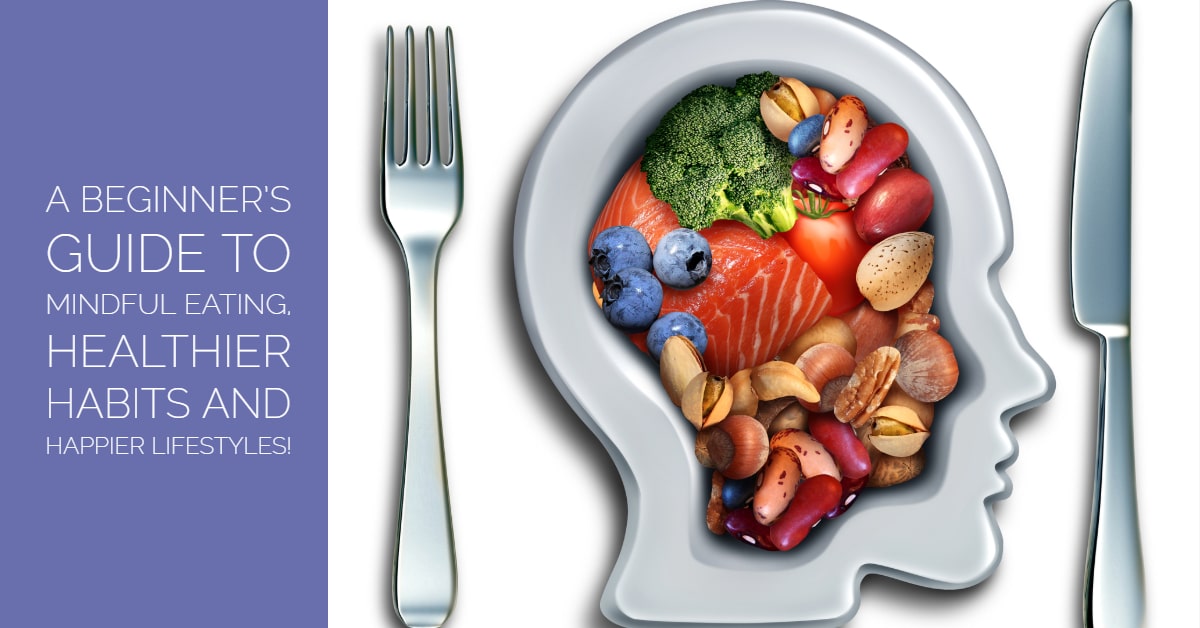A beginner’s guide to mindful eating & better habits

A beginner’s guide to mindful eating, healthier habits and happier lifestyles!
Mindful eating is thought to help people regain control over bad eating habits, assist them in losing weight and promote a healthier lifestyle, but what does it entail – and where do you even start?
The term mindfulness is the latest buzzword going around at the moment and relates to giving your full attention to the activity in front of you, without becoming distracted. It’s based around an old Buddhist concept and is considered to be a form of meditation that encourages you to recognise physical and emotional sensations.
Mindful eating allows you to enjoy a meal or snack by fully experiencing the flavours, how it makes you feel and, very importantly, how to know when you’re full. It’s also used to help treat eating disorders, depression and anxiety.
In a nutshell, mindful eating is about:
- Eating slowly, with no distractions
- Listening to your hunger cues to avoid overeating
- Distinguishing between actual hunger and cravings
- Engaging your senses by paying attention to the smells, sounds, textures and tastes of your food
- Making healthier eating choices
- Noticing the effects that certain food has on your mood
- Appreciating and enjoying meals
- Those who are able to achieve more mindful eating will notice a huge improvement in their attitude to food. It can help you achieve weight loss, curb cravings and teach you to appreciate food and waste less.
- Mindful eating in an ‘online’ world
Is mindful eating easy in our modern day society?
Practising mindful eating sounds simple, but these days we are bombarded with so many distractions that it can be hard to put all our focus on one task at a time – even eating. The internet, television, phones, work, email, social media are all vying for our attention, which makes it hard to be completely present at all times and focus on the task at hand.
Mindless eating often leads to overeating or bingeing
This leads us to go into ‘autopilot’ when doing everyday activities, like driving, cleaning, grooming and eating. When eating becomes a mindless act we run the risk of overeating or bingeing as it takes our brain 20 minutes to realise we’re full. When we wolf down our food quickly without awareness this signal won’t go to our brains until it’s too late, leading to binge eating.
Simple steps to start eating more mindfully
- Pause – before you eat, pause and take in the different colours, flavours and aromas on your plate. This short pause will help you become more aware of what is going into your body.
- Attention to every mouthful – as you put food into your mouth be mindful of the actual chewing. Take in the texture and flavours of each bite and savour it.
- Acknowledge your feelings – various thoughts, feelings and sensations will arise when you practice mindful eating and it’s important to acknowledge them. How does certain food make you feel, physically and emotionally?
- Remain mindful – without wanting to sound like a breaking record, it’s important to remain mindful throughout the meal. It’s easy to get distracted, and to begin with it might be difficult, but continue bringing yourself back in the moment and ignoring other niggling thoughts you have in the back of your mind.
Why practice mindfulness?
Eating shouldn’t be done on autopilot as it leads to bingeing and a loss of appreciation for the food we have. Rather, it should be an intentional act, done to sustain and care for our bodies and give us a sense of happiness and pleasure (yes, you should enjoy your food and eating!)
Once you begin to pay more attention to your hunger and fullness cues you’ll also be able to understand why you’re eating. Are you truly hungry or are you actually stressed, upset or bored? It’s important to understand the triggers for why you’re eating as emotional bingeing is a leading cause of weight gain and obesity.
Once these triggers have been established you can decide whether it’s worth giving in to your craving.
Lose weight with mindful eating
Perhaps one of the biggest benefits of becoming a more mindful eater is that it can help you lose weight and, more importantly, keep it off.
Fad diets are great for shedding the pounds but most of them aren’t created to work in the long run, which means you will eventually put the weight back on. The main reason behind excess weight gain is bingeing, emotional eating and cravings. However, mindful eating can help you lose weight by teaching you to recognise the cues, change your eating behaviours and reduce stress levels.
Think about the last few times you indulged in fatty junk food or binged on an entire packet of biscuits, sweets or crisps. What were you doing and how did you feel at the time? Many people refuse to confront stress or depression, preferring to turn to something sweet or unhealthy to ‘cheer them up’. Of course, after they’ve finished eating, the emotions are still there. In fact, they usually feel much worse and guilty and the same thing is likely to happen again. It’s a vicious circle and can only be broken when we are mindful of what and why we’re eating.
Stop binge eating – for good
Binge eating involves mindless eating, without control, and can lead to excess weight gain, and is even linked to obesity. One of the worst things you can do to your body is to stuff it with a large amount of food, within a short amount of time.
Mindful eating can help stop you from bingeing as it forces you to look closer into what foods you are eating and recognise certain cues, such as when you’re full. It can also curb unwanted cravings and stop you from impulse eating when you’re out.
Start your mindful eating journey today
Eating more mindfully is relatively simple once you get accustomed to it, but like any new habit, it won’t happen overnight. Some people will turn to online seminars and meditations to help them, but you can still get started with these simple steps:
Practice gratitude
A big part of eating mindfully is to appreciate every single bite that goes into our mouths. Practising gratitude can help you assess whether you are eating food for sustenance, fun, or just for the sake of it. If it’s the latter, chances are you won’t finish your meal or enjoy it as much, leading to waste. To be more grateful, think about the hard work put into making your food and how the ingredients came to your plate.
Remove any distractions
Televisions, phones and laptops should all be switched off during meal times. This is easier said than done, but it is a huge step towards eating more mindfully.
You should put your undivided attention to your food and eating. This goes for ‘desk lunches’ too. Resist working through your lunch break as your mind will be on emails and work rather than the food in front of you.
Chew more
Did you know Buddhist monks and nuns chew each bite of food at least 30 times, to practice mindful eating? In our fast-paced world it’s easy to wolf down your food in a few bites without thinking much of it.
Eating this quickly can play havoc with our digestive systems and stop us from savouring each bite. Now, I’m not suggesting you chew each mouthful of food 30 times, but it’s important to slow down and chew food properly to allow for proper digestion.
Eat in silence
Buddhist monks also eat in complete silence. This might feel strange at first, especially if you have a big family and eat around a dining table, or are out for lunch with a friend.
If you can’t practice eating in COMPLETE silence, I would suggest taking short breaks from conversations to eat mindfully, before resuming. And whatever you do, don’t eat while you’re on the phone!
Critique the food
As you’re eating take time to really think about the food – like a food critic would. Think of how you would describe the tastes, aromas and textures to a reader. This will help you be more mindful as it forces you to think deeper about what is on your plate.
Pay attention to all the small details, as if you are going to write a review about the meal. Just remember not to become too critical or voice your thoughts out loud!
Eat complicated food
Complicated food will automatically force you to be more mindful as you’re not shovelling it down thoughtlessly.
Obviously, this isn’t something you can do all the time (unless you can afford to live off a diet of pistachios and lobster that is…), but try and reach for snacks that take a bit of work to eat. This could be anything from shelled nuts, to oranges and seeded fruits.
Bottom line about mindful eating
Remember, mindful eating won’t come automatically to you at first. We’ve been conditioned to do everything ‘on the go’ and as quickly as possible. If you find you’re struggling, start slow, by picking one meal to practice mindful eating with for a week. Then, gradually work your way to all meals and even snacks.
Soon it will become a natural part of your eating and you’ll notice some truly amazing results.
Pro-tip: If you feel you can’t get your bingeing and emo-eating rollercoasters under control, I strongly suggest looking for professional help.
My relationship with food and addictions
As you may have read before on other posts or in my book, my own relationship with food was very complicated. From the age of fifteen up until my early thirties, I struggled with bulimia and viewed all food as the enemy.
I was totally obsessed with my weight and, although I was naturally slim when I looked in the mirror all I could see was an ugly, fat person looking back – I hated myself. I’d also religiously count every calorie, which was, frankly, quite pathetic and tiring.
Years of suffering from this eating disorder took its toll on my body and did some serious damage to my digestive system, stomach and gut. I have so many regrets from that dark period of my life, but I can’t turn back time, all I can do is focus on the present and make the best of now and the future.
Soon after recovering from my eating disorder I developed other illnesses like hypothyroidism, adrenal fatigue, chronic fatigue and later also Lyme disease. I constantly felt super tired and sick and doctors offered little or no solution.
Since the age of 32, I became clean with all my addiction for once and for good. Drugs, cigarettes, bulimia etc… I am truly happy that those dark days are over and I will never go back to that dark path of my life. One of my biggest achievements in my life till now was beating my eating disorder… It was honestly one of the hardest things I achieved and it took me years of shrinking and therapies.
But I did it. Truly an amazing experience and something I am truly proud of. Every single day of my life. As without it, I would have been dead by now.
Where to find more information on mindful eating & living?
- Amazon: there are many helpful books about mindful eating available on Amazon
- Bone Broth Breakthrough – Transform Your Body with Bone Broth Protein, the Ultimate Food to Support Gut Health, Metabolism, Lean Muscle, Joints and Glowing Skin. Dr. Axe’s transformational bone broth programs includes a 3-day cleanse, 7-day challenge and a 30-day bone broth protein dietary plan to help you reach your highest level of health.
- The Paleo Mom: Delectable Paleo Paking Recipes Your Family Will Love Paleo has reached everywhere, breakfast, dessert, lunch, snack, dinner, BBQ and everything! It is needless to say that the super chefs have incorporated paleo in “baking” as well as the market demands it.
- Pure and Simple: A Natural Food Way of Life In Pure and Simple, Pascale Naessens shares her method for staying happy, healthy, and slim, with more than 60 recipes. She recommends a lifestyle that embraces only natural, unprocessed foods, but she is not advocating for a diet dominated by restrictions. Instead, she celebrates delicious meals, pleasure, and health. Her approach has only one rule—no carbohydrates with protein
- Fat for Fuel Ketogenic Cookbook: Recipes and Ketogenic Keys to Health from a World-Class Doctor and an Internationally Renowned Chef Food is medicine. Hippocrates himself, 16 centuries ago, understood this essential truth about healing. Today, natural-health expert Dr. Joseph Mercola and superstar Australian chef Pete Evans share the firm belief that food can be a powerful tool to reshape our health
- Web resourses: In there 10-day meditation series, you’ll practice staying present when enjoying your food, and with the 7-day mindful eating plan outlined below, you can get tips on making thoughtful food choices throughout the week.
- Workshops and retreats: Through mindfulness, mindful eating and heart-based practices, you can cultivate the clear seeing, heartfulness, joy and ease that can help bring your eating and life back into balance.
Empowering others via my anti-ageing wellness platform and holistic health books
I hope you liked this beginners guide to mindful eating. If you would like to learn more about holistic living and clean beauty lifestyle, ensure to check out other pages of this anti-ageing wellness platform.
I changed the way I eat in 2011 when I was diagnosed with hypothyroidism, chronic fatigue and adrenal fatigue, conditions where the thyroid is affected. I had no energy, was exhausted, desperate, and my weight had sky-rocketed.
Because of that, I decided to ditch sugars, processed foods, grains, dairy and toxic chemicals. And step-by-step, I introduced a whole-foods-based (first Paleo) and later an AIP (autoimmune protocol) friendly ketogenic approach to food which gave me my life, vitality, happiness and energy back!
Now, through my holistic wellness books and anti-ageing health platform, I want to empower people around the world do the same and regain their health, hair, life, vitality and beauty!




